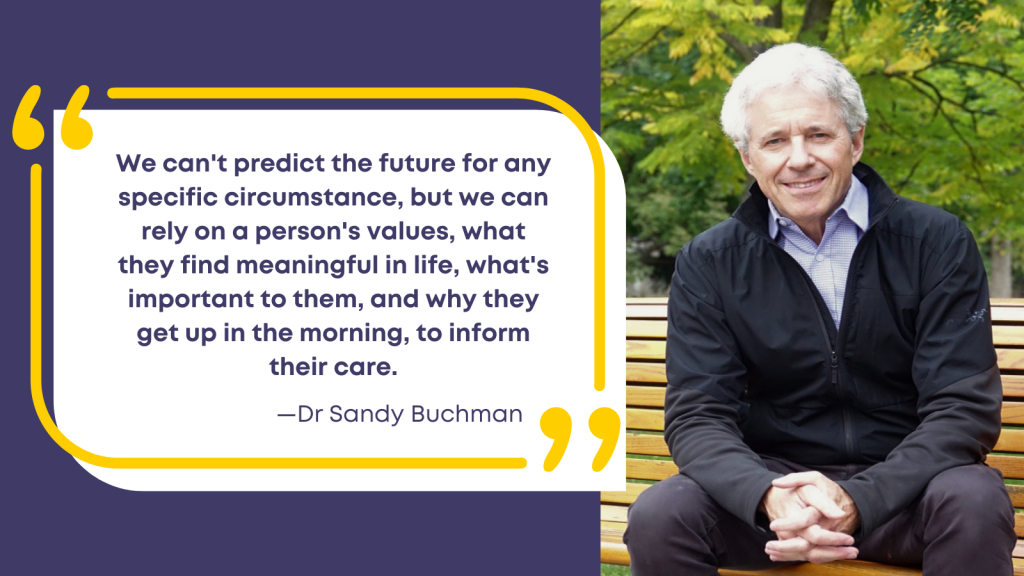The Advance Care Planning in Canada team recently sat down with Dr. Sandy Buchman, Past-President of the Canadian Medical Association and ACP champion, to discuss advance care planning and key findings from the 2021 national poll. You can follow him on Twitter @DocSandyB
Dr. Buchman was introduced to advance care planning (ACP) in the 1980s as a primary care HIV physician. Since then, he has become an avid champion of ACP and quality palliative and end-of-life care.
He knows firsthand the value of ACP conversations, both as a physician working with his patients in times of crisis, and within his own family as a father to grown children and a son to ageing parents.
This article is the second of a multi-part part series with Dr. Buchman.
The first article explores barriers around advance care planning.
In this article he discusses his experiences with advance care planning and its importance in health planning.
When did advance care planning become important to you?
I think it came to my awareness during the AIDS crisis in the 1980s as a primary care physician. It introduced me to palliative care and the importance of having those planning discussions around the care that people want.
Although it was the AIDS epidemic that introduced me to advance care planning, I started introducing it to all my patients during their annual health review. As I developed a trusting relationship with them, I would gradually introduce the concept and ask if they’d had any conversations with their loved ones. I emphasized the need to choose a substitute decision maker, someone who they would want to speak for them, if they were unable to speak for themselves.
We would talk about it over time, in a slow reflective way, so that we could really understand what they wanted, and respect their wishes. I would also encourage them to speak with their loved ones who they had chosen as their substitute decision maker. This helped make sure everybody was on the same page.
Why is advance care planning important?
For my wife and I it’s very important. As seniors ourselves and primary caregivers to my parents, the process of advance care planning is very comforting to us. We’ve chosen one of our sons as our substitute decision maker, and our family is fully aware of our wishes and what’s meaningful and important to us.
Through my practice, planning for what’s coming when you’re not in crisis is so important. Having your goals, your values, and what gives your life meaning respected all the way along, through a serious illness and beyond to end of life, is so critical.
It not only ensures that your wishes are respected, but that your loved ones, even if they may disagree with your wishes, don’t have the burden of trying to figure it out in a crisis. And I’ve seen too many families who didn’t have this process suffer immeasurably.
It also impacts their relationships. For example, siblings of an elderly parent could disagree when the parent’s goals or values aren’t known and be unsure of how to proceed with difficult decisions around their illness. An advance care plan avoids so much heartache and emotional burden.
When a patient comes to me with an advanced care plan it’s a wonderful experience. It doesn’t matter what their prognosis is. We can guide their treatment responses in accordance with their values and preferences because they’re open to talking about it — they’re not in a state of denial.
We can’t predict the future for any specific circumstance, but we can rely on a person’s values, what they find meaningful in life, what’s important to them, and why they get up in the morning, to inform their care. We’re able to use that to guide their loved ones to making the healthcare decisions that are right for them.
What is your advice to Canadians about advance care planning?
Don’t wait until it’s too late. Seize the day. While you’re healthy, start those conversations with substitute decision makers, those you trust with your life to understand your wishes, values or faith, and who can ensure your health care decisions are respected.
To learn more and get started visit advancecareplanning.ca

